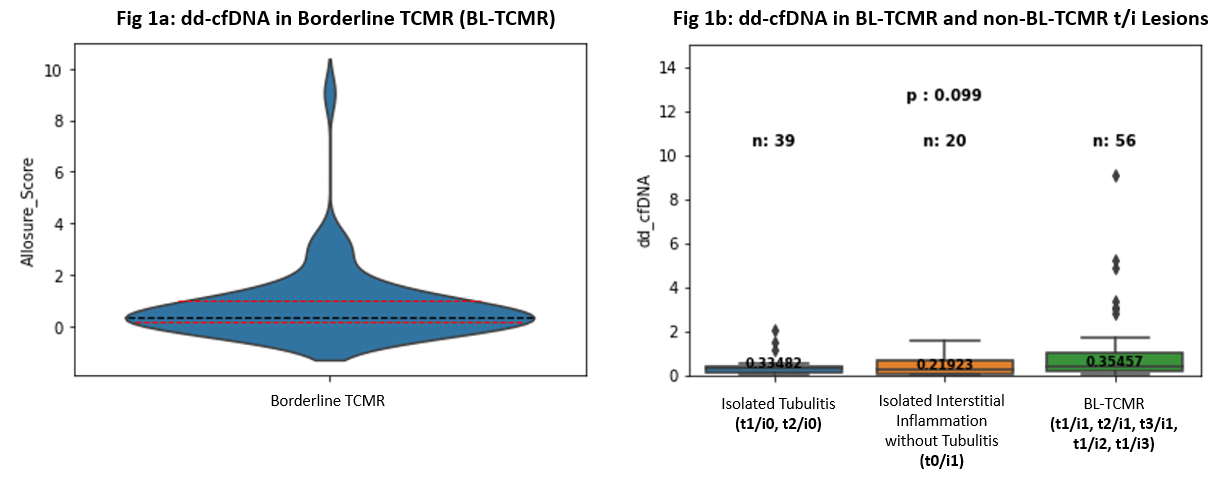Wide Spectrum of Molecular Injury Highlights Heterogeneity of Banff Tubulitis and Interstitial Inflammation Lesions
1Duke University, Durham, NC, 2University of Southern California, Los Angeles, CA, 3Cedars-Sinai Medical Center, Los Angeles, CA, 4University of Colorado, Aurora, CO, 5University of Utah, Salt Lake City, UT, 6Johns Hopkins School of Medicine, Baltimore, MD, 7CareDx, Brisbane, CA, 8University of California, San Francisco, San Francisco, CA
Meeting: 2022 American Transplant Congress
Abstract number: 1672
Keywords: Histology, Inflammation, Kidney transplantation, Rejection
Topic: Clinical Science » Kidney » 34 - Kidney: Acute Cellular Rejection
Session Information
Session Name: Kidney: Acute Cellular Rejection
Session Type: Poster Abstract
Date: Tuesday, June 7, 2022
Session Time: 7:00pm-8:00pm
 Presentation Time: 7:00pm-8:00pm
Presentation Time: 7:00pm-8:00pm
Location: Hynes Halls C & D
*Purpose: The pathological definition and clinical significance of borderline T cell-mediated rejection (BL-TCMR) remains an area of active debate, leading to inconsistencies in therapeutic strategy. Previously published data suggests that donor-derived cell-free DNA (dd-cfDNA) levels at the time of BL-TCMR diagnosis may identify patients at risk of adverse long-term outcomes. We characterized dd-cfDNA levels associated with BL-TCMR among patients enrolled in the Kidney allograft Outcomes AlloSure Registry (KOAR, NCT03326076).
*Methods: Patients with BL-TCMR findings (Banff 2019) on either for-cause or surveillance biopsy and a dd-cfDNA result within 30 days were included in the analysis. Patients with biopsies showing isolated tubulitis or interstitial inflammation without tubulitis were also analyzed.
*Results: We identified 56 cases of BL-TCMR with paired dd-cfDNA results (obtained within 30 days); median dd-cfDNA among these patients was 0.34% (IQR: 0.17 – 1.00) [Figure 1a]. The differences in dd-cfDNA among individual BL-TCMR combinations (t1/i1, t2/i1, t3/i1, t1/i2, t1/i3) were not significant, though the number of t3/i1 (n = 3, dd-cfDNA = 0.04%, 4.85%, 9.06%) and t1/i3 (n = 1, dd-cfDNA = 3.03%) cases was small. No differences were observed between biopsies with BL-TCMR and those with isolated tubulitis (t1/i0, t2/i0) or isolated inflammation without tubulitis (t0/i1) [Figure 1b]. 31 of 56 BL-TCMR cases had prior dd-cfDNA measurement, with median result of 0.24% (IQR: 0.20 – 0.37) obtained 63 (IQR: 53.5 – 100) days before the index biopsy. The median percent increase between these sequential results was 55% (IQR: -9 – 235%).
*Conclusions: Substantial heterogeneity is observed both with regards to dd-cfDNA levels at the time of BL-TCMR and the trajectory of dd-cfDNA preceding index biopsy. More importantly, no differences in dd-cfDNA are observed between BL-TCMR and t/i lesions not presently included in Banff criteria for BL-TCMR. These findings suggest that BL-TCMR, isolated tubulitis, and isolated inflammation without tubulitis represent a spectrum of molecular injury that may be further characterized or risk-stratified via assessment of dd-cfDNA.
To cite this abstract in AMA style:
Ellis MJ, Maw T, Huang E, Stites E, Shihab F, Brennan DC, Shekhtman G, Agrawal N, Zeng J, Kung S. Wide Spectrum of Molecular Injury Highlights Heterogeneity of Banff Tubulitis and Interstitial Inflammation Lesions [abstract]. Am J Transplant. 2022; 22 (suppl 3). https://atcmeetingabstracts.com/abstract/wide-spectrum-of-molecular-injury-highlights-heterogeneity-of-banff-tubulitis-and-interstitial-inflammation-lesions/. Accessed February 18, 2026.« Back to 2022 American Transplant Congress

